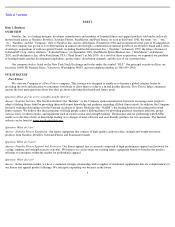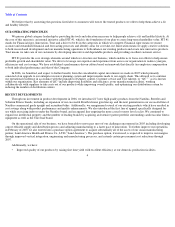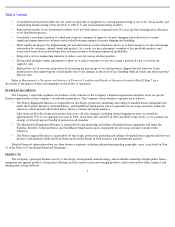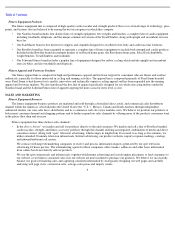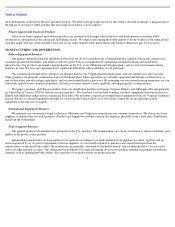Nautilus 2006 Annual Report Download - page 15
Download and view the complete annual report
Please find page 15 of the 2006 Nautilus annual report below. You can navigate through the pages in the report by either clicking on the pages listed below, or by using the keyword search tool below to find specific information within the annual report.
Table of Contents
A significant decline in availability of media time or fluctuating advertising rates may hinder our ability to effectively market our
products and may reduce profitability
We depend primarily on television commercials and television infomercials to market and sell our direct-marketed products.
Consequently, a marked increase in the price we must pay for our preferred media time or a reduction in its availability may adversely impact
our financial performance.
A decline in consumer spending due to unfavorable economic conditions could negatively affect our product revenues and earnings
Success of each of our products depends substantially on the amount of discretionary funds available to consumers and their purchasing
preferences. Economic and political uncertainties could adversely impact the U.S. and international economic environments. A decline in
general economic conditions due to increased freight and transportation costs as well as increasing interest rates, among other factors, could
further depress consumer spending, especially discretionary spending for premium priced products like ours. Higher interest rates could
increase monthly payments for consumer products financed through one of our monthly payment plans. These poor economic conditions could
in turn lead to substantial decreases in our net sales.
If we are unable to anticipate consumer preferences or to effectively develop, market and sell future products, our future revenues and
earnings could be adversely affected
Our future success depends on our ability to develop or acquire the rights to, and then effectively produce, market, and sell new products
that create and/or respond to new and evolving consumer demands. Accordingly, our net sales and profitability may be harmed if we are unable
to develop, or acquire the rights to new or different products that satisfy consumers’ preferences. In addition, any new products that we market
may not generate sufficient net sales or profits to recoup their development or acquisition costs.
A delay in getting foreign sourced products through customs in a timely manner could result in cancelled orders and unanticipated
inventory accumulation
Many of our imported products are subject to duties, tariffs or quotas that affect the cost and quantity of various types of goods imported
into the U.S. or our other sales markets. The countries in which our products are produced or sold may adjust or impose new quotas, duties,
tariffs or other restrictions. Further, our business depends on our ability to source and distribute products in a timely manner. As a result, we
rely on the free flow of goods through open and operational ports worldwide. Labor disputes at various ports create significant risks for our
business, particularly if these disputes result in work slowdowns, lockouts, strikes, or other disruptions during our peak importing seasons. Any
of these factors could have a material adverse effect on our business, potentially resulting in reduced revenues and earnings, cancelled orders
by customers, and/or unanticipated inventory accumulation.
Unpredictable events and circumstances relating to our international operations, including our use of foreign manufacturers, could
result in cancelled orders, unanticipated inventory accumulation, and reduced revenues and earnings
A portion of our revenues is derived from sales outside the U.S.; for the year ended December 31, 2006, international sales represented
approximately 17% of our consolidated net sales. In addition, a substantial portion of our products is manufactured outside of the
U.S. Accordingly, our future results could be materially adversely affected by a variety of factors, including changes in a specific country’s or
region’s political or economic conditions, trade restrictions, import and export licensing requirements, changes in regulatory requirements,
additional efforts to comply with a variety of foreign laws and regulations, and longer payment cycles in certain countries thus requiring us to
finance customer purchases for a period of time longer than those made in the U.S.
13


